Parliament starts face-off over cabinet seat

Both chambers of parliament are meeting in a joint session to elect a new cabinet minister for the seven-member multi-party government.
Three official candidates are standing. Barring unforeseen developments, the election will boil down to a showdown between Didier Burkhalter – who will try to defend the seat of the Radical Party – and Urs Schwaller hoping to take back a second cabinet seat his Christian Democrats lost six years ago.
The election became necessary after Interior Minister Pascal Couchepin announced his resignation after more than 11 years in cabinet.
Given the strength of the political parties in parliament, a candidate needs the votes of at least two major groups to win a majority among the 200 members of the House of Representatives and the 46 strong Senate.
The race between Senators Burkhalter and Schwaller appears to be open. Despite their different party colours both are seen as similarly solid and unspectacular politicians. Both can count on a certain level of support from other groups.
The question remains who will be able to win the bigger share of the vote from the centre-left Social Democrats and Greens, making the outcome unpredictable.
The second official Radical Party candidate, Christian Lüscher, is seen as a conservative with links to Geneva’s private banking community. It is unsure that he will make it to the decisive round of voting, despite the backing of the rightwing Swiss People’s Party.
Some members of the centre-left have been pushing for wildcard Dick Marty, but the highly respected Radical Party senator from the Italian-speaking minority of the country is unlikely to win much support.
An added element of suspense is provided by the fact the election is held as a secret ballot and parliamentarians are not subject to a party whip. This leaves room for speculation about possible late-night deals struck on the eve of the election in Bern’s bars and backrooms during what has been termed the “Night of the Long Knives”.
Personalities
The choice between the two main contenders is seen by many as a choice of personalities, – a view not shared by political scientist Michael Hermann of Zurich University.
He says the seat at stake on Wednesday could help tip the balance in the seven-member cabinet when deciding individual policy issues.
“The party that wins the seat can create either a centre-right or a centre-left majority,” Hermann said.
He adds that the outcome of the election will not mean a fundamental policy change, but is likely to have an impact on cabinet decisions.
“It is a question whether the Radicals could lose their leading role if their second seat goes to the Christian Democrats.”
Hermann’s research shows that the Radicals – the Grand Old Party and founders of modern-day Switzerland – have benefited from the rise of the People’s Party over the past few years.
Minorities and consensus
The Neue Zürcher Zeitung newspaper, which is said to be close to the Radicals, cautioned that a shift to the left in the cabinet could strain the system of consensus and power-sharing. Alliances on election day do not last long as shown in the recent past according to the paper.
In a similar vein, the Geneva-based Le Temps lists three risks if the Radicals were to be defeated.
It predicts a further weakening of a long-standing formula of power-sharing between the main parties and a potentially major blow for the Radicals in western Switzerland.
In addition the French-language daily is concerned that the French language minority of the country would be underrepresented if the Christian Democratic candidate were elected. He is perfectly bilingual, but hails from a small German-speaking area in the mainly French-speaking region.
“It could spark frustration among many French speakers in western Switzerland which would come on top of the anger of the Italian speaking minority.”
This language group has not been represented in the cabinet for ten years and the Radicals refused to put their prominent Italian-speaking president on the ticket for the election.
An unwritten law says at least two members in the cabinet have to come from non-German speaking regions. The constitution says merely that the different regions and language groups of the country have to be represented appropriately.
Urs Geiser, swissinfo.ch
Parliament is to elect the 112th cabinet member in modern Swiss history.
About 400 journalists and technicians are reporting from the event which is broadcast live on radio, television and via online media.
The portfolio of the new member will be decided next Friday by the cabinet.
The multi-party cabinet consists of seven ministers with equal powers. The president has a largely ceremonial role which is rotated on an annual basis.
Cabinet decisions are taken collectively and on the basis of consensus, but it is not a coalition government.
The centre-right Radicals, the founders of modern-day Switzerland in 1848, hold two seats.
The other major centre-right party, the Christian Democrats, lost their second seat in 2003 following a challenge by the rightwing Swiss People’s Party and ending nearly 50 years of an unchanged party-political makeup of the cabinet.
The People’s Party temporarily gave up its two seats in 2007 after their strongman Christoph Blocher failed to win re-election, but it took back a seat last year.
The newly-created, more moderate Conservative Democratic Party presently also has one seat as do the Christian Democrats.
The centre-left Social Democrats have two representatives in the cabinet.
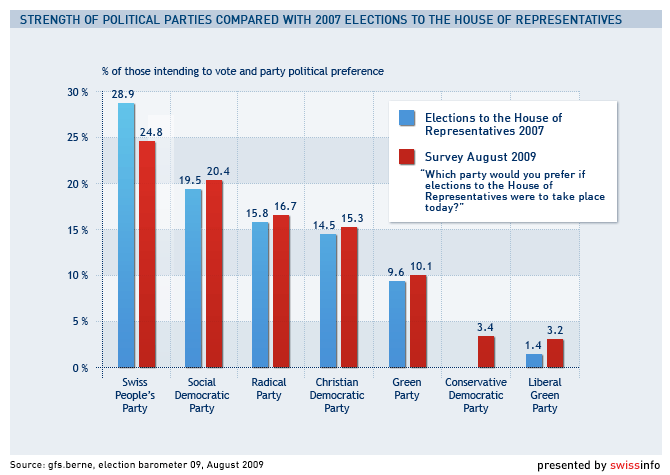

In compliance with the JTI standards
More: SWI swissinfo.ch certified by the Journalism Trust Initiative









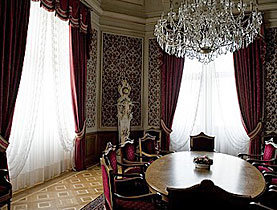
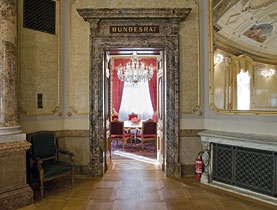
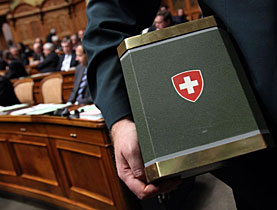
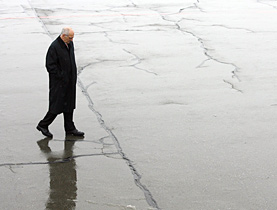

You can find an overview of ongoing debates with our journalists here . Please join us!
If you want to start a conversation about a topic raised in this article or want to report factual errors, email us at english@swissinfo.ch.